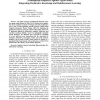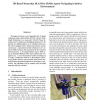16 search results - page 3 / 4 » Ikaros: Building cognitive models for robots |
IAT
2010
IEEE
13 years 5 months ago
2010
IEEE
Abstract--The paper proposes a biologically-inspired cognitive agent model, known as FALCON-X, based on an integration of the Adaptive Control of Thought (ACT-R) architecture and a...
ICRA
2005
IEEE
14 years 1 months ago
2005
IEEE
— Imitation is a powerful mechanism for transferring knowledge from an instructor to a na¨ıve observer, one that is deeply contingent on a state of shared attention between the...
ICRA
2009
IEEE
14 years 2 months ago
2009
IEEE
— In this paper, we introduce a cognitive approach for object tracking from a mobile platform. The approach is based on a biologically motivated attention system which is able to...
ETFA
2008
IEEE
14 years 1 months ago
2008
IEEE
This paper presents a novel algorithm for 3D depth estimation using a particle filter (PFDE - Particle Filter Depth Estimation) in a monocular vSLAM (Visual Simultaneous Localiza...
AR
2006
13 years 7 months ago
2006
The development and expression of many higher level cognitive functions, such as imitation, spatial perception, and tool-use relies on a multi-modal representation of the body kno...


